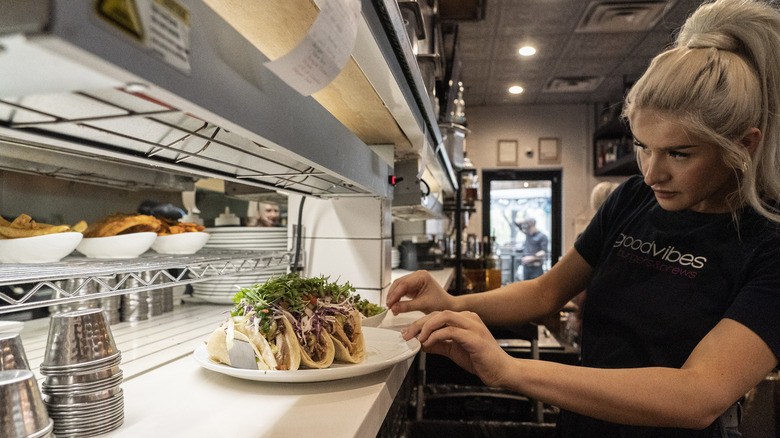New Study Shows The Culprit Behind Foodborne Illness In Restaurants
According to a study recently published by the Centers for Disease Control and Prevention, the primary cause of foodborne illness in dining establishments has to do with poor paid sick leave practices. Per the study, which appeared in the CDC's Morbidity and Mortality Weekly Report, approximately 40% of food poisoning outbreaks that took place in American restaurants between 2017 and 2019 involved an ill staff member handling food. Additionally, only 43.6% of the establishments involved in the study said that paid sick leave was available to employees.
Very few people want to report to work while ill, but this is an unfortunate reality for most workers in the U.S., particularly within the service and hospitality industry. Calling off while sick can result in lost wages when paid sick leave is not an option. And in some cases, an employee may be dismissed from their job after taking an absence due to illness. As a result, restaurants must review their current paid sick leave practices, while also ensuring that sick workers have the information necessary to protect themselves and prevent the spread of illness to others.
CDC study highlights deficient labor practices
As stated in the CDC study, regulations that ensure proper paid sick leave for workers have been shown to reduce instances of foodborne illness in dining establishments. However, the CDC found other discrepancies that pose problems when it comes to ill workers. While 91.7% of the managers involved in the study stated their restaurant has policies requiring notification when an employee is ill, only 66% said that these policies were available in writing. Even worse, only 23% of those interviewed stated that their policies listed the five symptoms that require a worker to stay home to prevent contamination (sore throat with fever, diarrhea, jaundice, vomiting, and a wound or lesion with pus).
Based on these responses, the CDC urges dining establishments to adopt essential practices to ensure staff and customers remain healthy. Restaurants must have clearly communicated policies asking workers to provide notification to managers when sick. Also, policies must include the five symptoms listed above so that workers can make informed decisions regarding their health. Finally, establishments must implement policies that restrict sick employees from reporting to work. Despite the efficacy of these practices, they won't offer much benefit unless restaurants overhaul their paid sick leave policies. Until that time, restaurant staff will need to make tough decisions: Call off and potentially lose their job, or conceal an illness to support their livelihoods.

